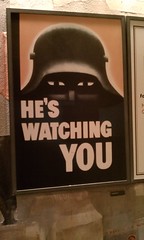
Yesterday I took the train up from Richmond to Washington to visit with Kathryn Greenhill and family. They’re on a whirlwind holiday spanning the globe, and since it’s not often I get to visit with folks from the other side of the world, I snatched the opportunity to spend most of the day with them.
I learned quite a few things on this visit — from vocabulary like rubbish bins and biscuits (trash cans and cookies, respectively) to how to avoid being uncovered as a secret agent. I also learned that a smartphone and a useful mobile web interface can take a lot of stress out of travel.
After visiting a farmer’s market near DuPont Circle and the Gertrude Stein exhibition in the National Portrait Gallery, we toured the International Spy Museum. The museum is enormous, with displays that bleed from one to the next and never seem to end, until suddenly you find yourself at the exit. We had been there for two hours when it occurred to me that my time was running out.
After we made our way back to the Metro stop and said our goodbyes, I had just enough time to get back to Union Station and catch my train home. Or, I would have, if I had made sure I was going the right direction on the Metro. Two stops later I realized I was on the wrong train, and I assessed my options.
By the looks of things, the correct train wasn’t going to be coming by anytime soon, so I decided to hoof it to DuPont Circle (where I landed instead of Union Station) and catch a cab. Union Station was fairly close, and the cab maybe could get me there in time. Luckily, an available cab pulled up soon after I started looking for one. Not so luckily, we ran into too much traffic and I missed the train.
Normally, this would have prompted a huge breakdown with frustration and tears directed at myself for screwing up. However, by the time we were half-way to the station, I already knew that I would miss the train (it was early and left on the dot), and that there were three more trains going to Richmond this evening, so I’d get home one way or another.
Without my smartphone, and the information it provided me, I would have had to sit in worry and self-directed anger for the long minutes it took to get from DuPont to the Amtrak ticket counter at Union Station. Knowing I had plenty of options meant that worry was unnecessary and avoidable.
My smartphone is a lot of things to me (my calendar, my communications, my social connection) and it’s also the antidote to one of my biggest stress triggers — the unknown.

